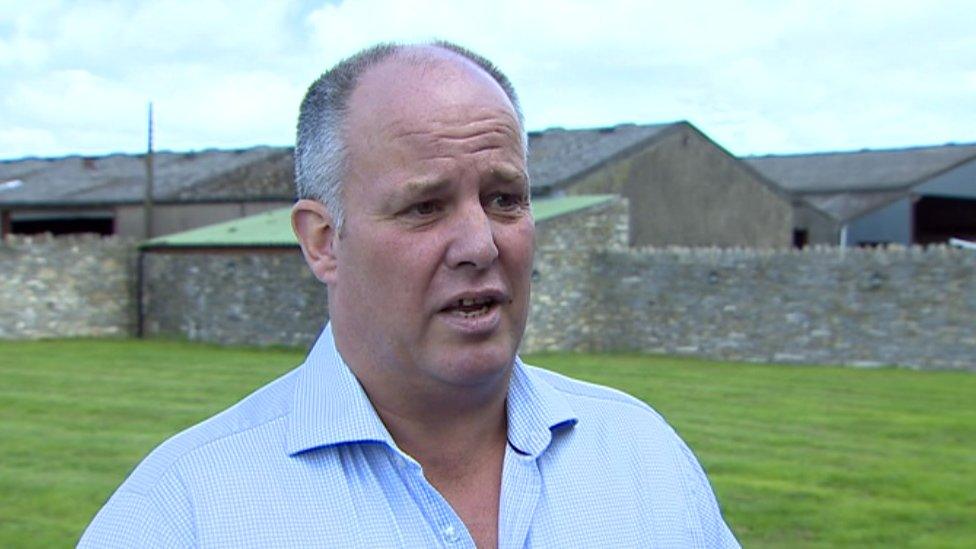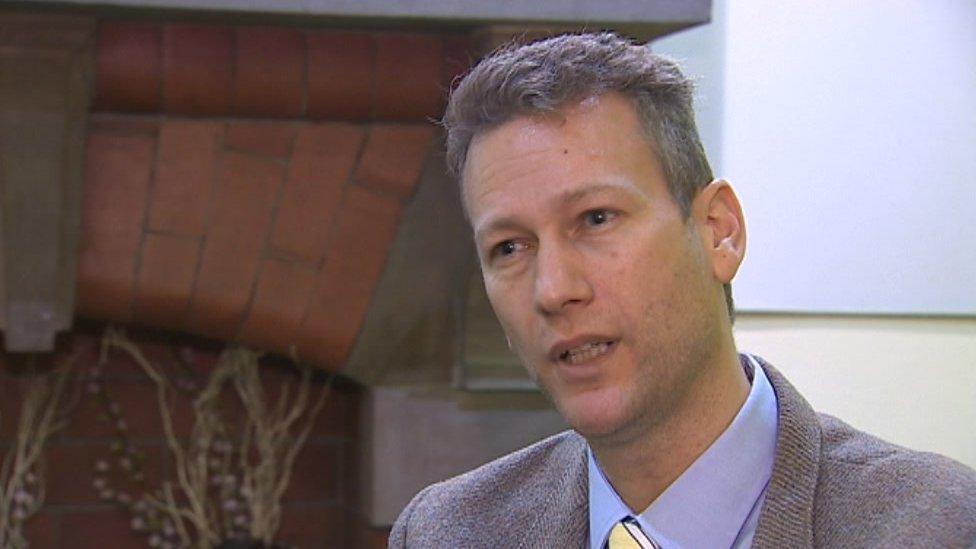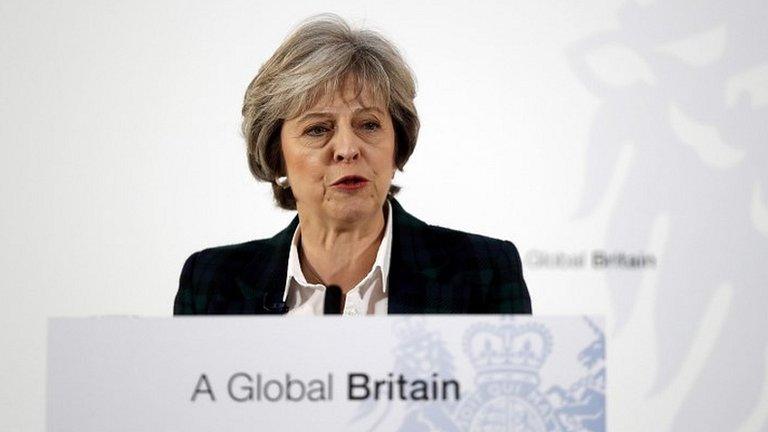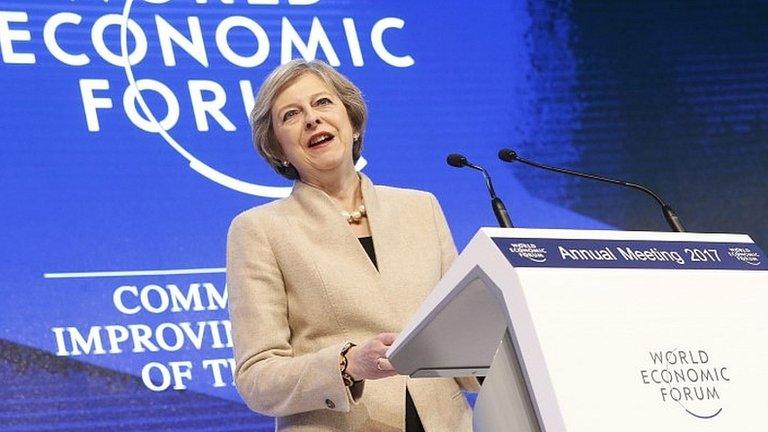Brexit speech by Theresa May divides Welsh parties
- Published
- comments
Theresa May confirmed that the final deal would be put to the vote in Parliament
Welsh politicians have clashed over Theresa May's announcement that the UK should leave the EU single market.
In a speech, the prime minister said staying in the single market would mean "not leaving the EU at all".
First Minister Carwyn Jones said he would still push for "full and unfettered access" to the single market, while Plaid Cymru MP Jonathan Edwards warned of an "extreme Brexit".
But Welsh Tory leader Andrew RT Davies denied it would damage the economy.
In a long-awaited speech, Mrs May said Parliament would get a vote on the final deal agreed between the UK and the European Union.
She promised an end to "vast contributions" to the EU, and said the devolved administrations would be "fully engaged" in the process of negotiating Brexit.
"I should equally be clear that no decisions currently taken by the devolved administrations will be removed from them," Mrs May.

Brexit speech: Key points
The UK should leave the European single market
Ministers will work for the "freest possible" free trade
A customs agreement with the EU, but has no "pre-conceived position"
Maintain the "common travel area" between the UK and Irish Republic
Continued "practical" sharing of intelligence and policing information
"Control" of immigration rights for EU citizens in the UK and UK citizens in EU
A "phased approach"
The final Brexit deal agreed between the EU and the UK to be voted on by both Houses of Parliament before it comes into force

Carwyn Jones says nothing should be done that "impairs the ability" of Welsh firms to export
First Minister Carwyn Jones told AMs that the prime minister spoke to him on the phone before her speech.
"Some of it was welcome ... the tone was better", he said during First Minister's Questions.
But as well as giving the Houses of Parliament a vote on the final Brexit deal, Mr Jones said the Senedd would need one too, as many of the terms would cover policy areas devolved to Wales.
He added: "There will be nothing to stop this Assembly from implementing European directives if it wishes to. There is no ban on doing that."
Mr Jones said he would continue to make the case to have "full and unfettered access" to the EU single market, despite Mrs May's insistence that the UK would leave.
"What we have to avoid in the next few months and years is anything that impairs the ability of businesses to export from Wales, and therefore makes it more difficult for them to employ people," he said.
Labour's Shadow Welsh Secretary Jo Stevens added: "With the PM set on a damaging hard Brexit, I'm fearful Wales will be left behind and made to suffer the terrible consequences of this incompetent Tory government."
Free movement unacceptable to British people, says Alun Cairns
Welsh Secretary Alun Cairns said Brexit gave the UK the opportunity to become "global leaders in free trade".
"There are new opportunities out there, the UK economy is exceptionally strong and both Wales and Welsh businesses are set to benefit from that", he said.
Mr Cairns added that he supported leaving the single market, saying the British people "won't accept and can't accept" the free movement of people.

Andrew RT Davies had backed the campaign to leave the European Union
Andrew RT Davies, who leads the Conservatives in the assembly, denied what he called a "clean Brexit" would be damaging to the Welsh economy.
"This was a hugely welcome speech from the prime minister, providing clarity and certainty ahead of the triggering of Article 50," he said.
"The onus now, in many ways, moves on to the EU itself and leaders on the continent will need to determine for themselves if they want to be part of a new trading agreement with the fifth largest economy in the world."
Jonathan Edwards says it is "worrying" that Theresa May is going for the "extreme option"
Mr Edwards, Plaid Cymru spokesman on leaving the EU, said: "The Prime Minister has put the British State on track for an 'extreme Brexit', isolating Wales and the other UK countries from the rest of the world.
"The Prime Minister has put appeasing her deluded right-wing politicians before protecting the economy and surely the Labour Party must now join Plaid Cymru in voting against triggering Article 50.
"The people voted to leave the EU, not the single market or the customs union.
"Nobody voted to make themselves redundant or give themselves a pay cut. For Wales - a country whose economy is heavily dependent on its exports - isolating ourselves from the single market will be disastrous."
He added that "The serious and disproportionate impact this will have on Wales' economy and devolved functions means that Wales' Parliament must also be asked to endorse the terms of the agreement before it goes ahead, not just Westminster."

Nathan Gill claimed the many of the political "elite" were not "respecting the will of the people"
UKIP's MEP for Wales Nathan Gill welcomed the speech, saying: "Remaining a member of the single market was never an option as it amounted to no Brexit at all.
"Too many of the 'elite' in media and politics are trying to re-live the referendum, rather than respecting the will of the people and moving forward.
"It's clear to me that the best deal for both Wales and the UK would be a free trade deal between the UK and EU, allowing British companies the freedom to trade with and operate in the single market, and let European businesses do the same here.
"It would also bring back control over immigration and end the supremacy of European courts."
While the prime minister said no decisions currently taken by the Welsh Assembly would be removed after Brexit, the Welsh Government is keen to take control of two major issues currently decided at EU level - farming subsidies and economic aid to Wales' poorest areas.
Asked by UKIP AM Mark Reckless about the repatriation of powers from Brussels, the first minister said: "If you look at agriculture, we take the decisions on agriculture. If you look at fisheries, we take the decisions on fisheries.
"There is no question of there being some kind of UK-wide agriculture policy that's not devolved on the basis of what the Prime Minister said today. That's quite clear to me."
He said the people of Wales would not want to see "Brussels bureaucrats replaced with Whitehall bureaucrats."
- Published17 January 2017

- Published16 January 2017
